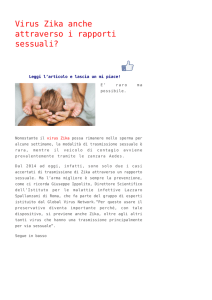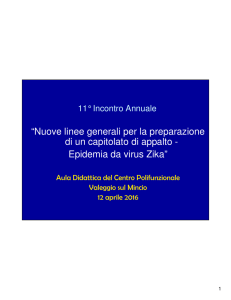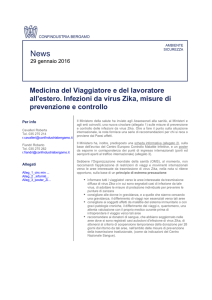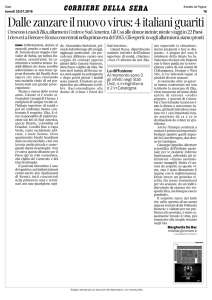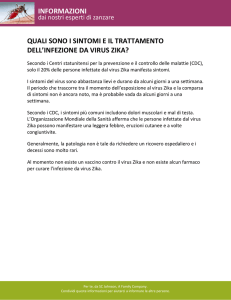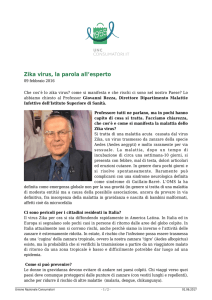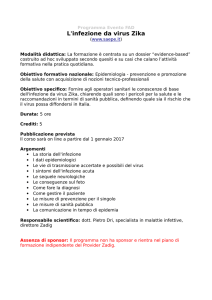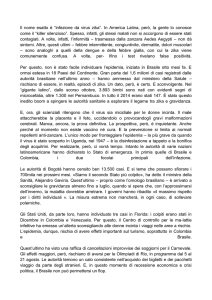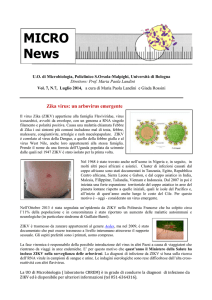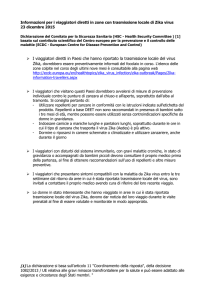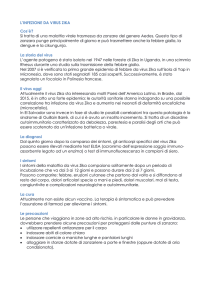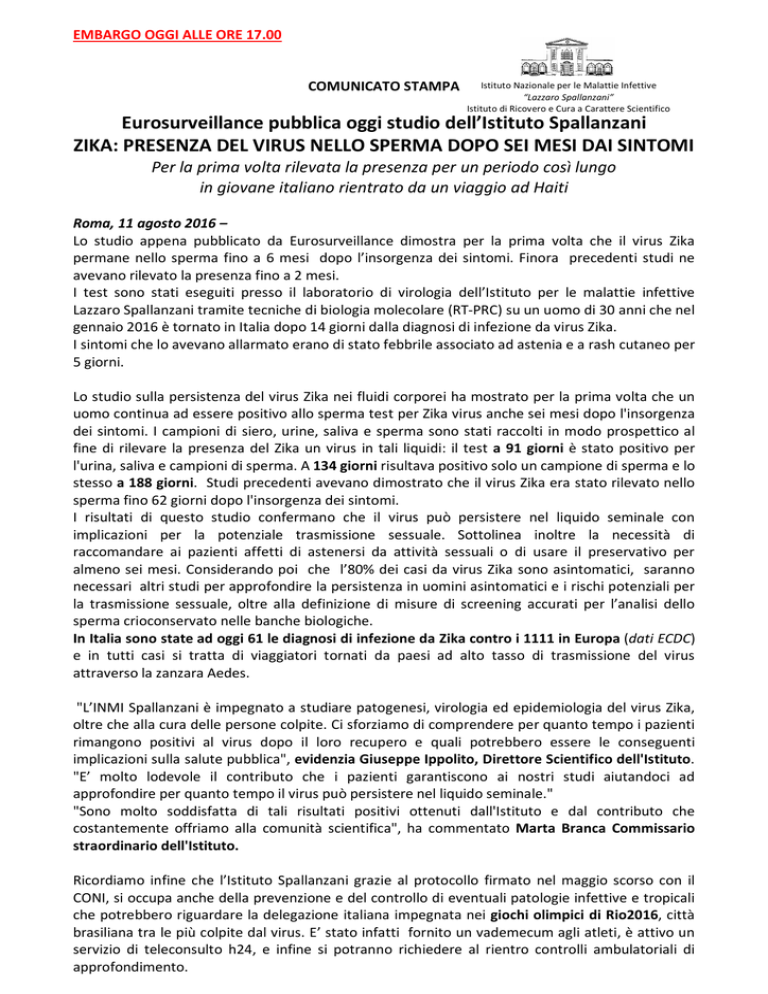
EMBARGO OGGI ALLE ORE 17.00
COMUNICATO STAMPA
Istituto Nazionale per le Malattie Infettive
“Lazzaro Spallanzani”
Istituto di Ricovero e Cura a Carattere Scientifico
Eurosurveillance pubblica oggi studio dell’Istituto Spallanzani
ZIKA: PRESENZA DEL VIRUS NELLO SPERMA DOPO SEI MESI DAI SINTOMI
Per la prima volta rilevata la presenza per un periodo così lungo
in giovane italiano rientrato da un viaggio ad Haiti
Roma, 11 agosto 2016 –
Lo studio appena pubblicato da Eurosurveillance dimostra per la prima volta che il virus Zika
permane nello sperma fino a 6 mesi dopo l’insorgenza dei sintomi. Finora precedenti studi ne
avevano rilevato la presenza fino a 2 mesi.
I test sono stati eseguiti presso il laboratorio di virologia dell’Istituto per le malattie infettive
Lazzaro Spallanzani tramite tecniche di biologia molecolare (RT-PRC) su un uomo di 30 anni che nel
gennaio 2016 è tornato in Italia dopo 14 giorni dalla diagnosi di infezione da virus Zika.
I sintomi che lo avevano allarmato erano di stato febbrile associato ad astenia e a rash cutaneo per
5 giorni.
Lo studio sulla persistenza del virus Zika nei fluidi corporei ha mostrato per la prima volta che un
uomo continua ad essere positivo allo sperma test per Zika virus anche sei mesi dopo l'insorgenza
dei sintomi. I campioni di siero, urine, saliva e sperma sono stati raccolti in modo prospettico al
fine di rilevare la presenza del Zika un virus in tali liquidi: il test a 91 giorni è stato positivo per
l'urina, saliva e campioni di sperma. A 134 giorni risultava positivo solo un campione di sperma e lo
stesso a 188 giorni. Studi precedenti avevano dimostrato che il virus Zika era stato rilevato nello
sperma fino 62 giorni dopo l'insorgenza dei sintomi.
I risultati di questo studio confermano che il virus può persistere nel liquido seminale con
implicazioni per la potenziale trasmissione sessuale. Sottolinea inoltre la necessità di
raccomandare ai pazienti affetti di astenersi da attività sessuali o di usare il preservativo per
almeno sei mesi. Considerando poi che l’80% dei casi da virus Zika sono asintomatici, saranno
necessari altri studi per approfondire la persistenza in uomini asintomatici e i rischi potenziali per
la trasmissione sessuale, oltre alla definizione di misure di screening accurati per l’analisi dello
sperma crioconservato nelle banche biologiche.
In Italia sono state ad oggi 61 le diagnosi di infezione da Zika contro i 1111 in Europa (dati ECDC)
e in tutti casi si tratta di viaggiatori tornati da paesi ad alto tasso di trasmissione del virus
attraverso la zanzara Aedes.
"L’INMI Spallanzani è impegnato a studiare patogenesi, virologia ed epidemiologia del virus Zika,
oltre che alla cura delle persone colpite. Ci sforziamo di comprendere per quanto tempo i pazienti
rimangono positivi al virus dopo il loro recupero e quali potrebbero essere le conseguenti
implicazioni sulla salute pubblica", evidenzia Giuseppe Ippolito, Direttore Scientifico dell'Istituto.
"E’ molto lodevole il contributo che i pazienti garantiscono ai nostri studi aiutandoci ad
approfondire per quanto tempo il virus può persistere nel liquido seminale."
"Sono molto soddisfatta di tali risultati positivi ottenuti dall'Istituto e dal contributo che
costantemente offriamo alla comunità scientifica", ha commentato Marta Branca Commissario
straordinario dell'Istituto.
Ricordiamo infine che l’Istituto Spallanzani grazie al protocollo firmato nel maggio scorso con il
CONI, si occupa anche della prevenzione e del controllo di eventuali patologie infettive e tropicali
che potrebbero riguardare la delegazione italiana impegnata nei giochi olimpici di Rio2016, città
brasiliana tra le più colpite dal virus. E’ stato infatti fornito un vademecum agli atleti, è attivo un
servizio di teleconsulto h24, e infine si potranno richiedere al rientro controlli ambulatoriali di
approfondimento.
Eurosurveillance
Persistent detection of Zika virus RNA in semen for six months after symptom onset in a traveller returning
from Haiti to Italy, January to July 2016
Authors:Emanuele Nicastri, Concetta Castilletti, Giuseppina Liuzzi, Marco Iannetta, Maria R Capobianchi,
Giuseppe Ippolito
Embargoed Until Thursday, August 11th 2016, 5:00 p.m. CET
Summary:
A study performed in Italy evidenced persistent detection of Zika Virus RNA in semen for six months after symptoms
onset. In January 2016 a young man had a history of fever, asthenia and skin rash during his stay in Haiti. On his return
to Italy, ZIKV RNA was detected in his urine and saliva up to three months after symptom onset and in his semen for
six months. The findings support the possibility of sexual transmission of ZIKV RNA and highlight the importance of
continuing to investigate non-vector-borne ZIKV RNA infection.
Title:
Persistent detection of Zika Virus RNA in semen for six months after symptom onset in a traveller returning from Haiti
to Italy, from January to July 2016
Authors:
Emanuele Nicastri, Concetta Castilletti, Giuseppina Liuzzi, Marco Iannetta, Maria R Capobianchi, Giuseppe Ippolito
The study:
A study into the persistence of Zika Virus RNA in body fluids shows for the first time that a men still produces semen
samples that test positive for Zika Virus six months after onset of symptoms.
The report, published today in Eurosurveillance, by Emanuele Nicastri and his collaborators, provides the first results
of a long-term study carried out by the National Institute for Infectious Diseases “Lazzaro Spallanzani” (INMI) in RomeItaly.
In January 2016, a previously healthy man in his early 30s reported to INMI a history of five-day self-limiting febrile
syndrome associated with asthenia and a skin rash during his staying in Haiti. Zika Virus (ZIKV) infection was diagnosed
in Haiti and the patient returned to Italy 14 days after symptom onset.
Serum, urine, saliva and semen samples have been prospectively collected. In order to detect the presence of the Zika
Virus in these fluids, the researchers of the INMI Laboratory of Virology used serological molecular biology techniques.
Testing of convalescent sera taken 91 and 134 days after symptom onset turned out to be ZIKV real-time RT-PCR
negative. On day 91, the test was positive for urine, saliva and semen samples. On day 134, only a semen sample was
positive. On day 188, a semen sample was still positive. The patient was not affected by any chronic disease or
immunological impairment.
Previous reports have shown that ZIKV RNA has been detected in sperm up to day 62 after symptom onset. The
results of this study confirm that virus could replicate specifically in the male genital tract and may persist in semen,
with implications for potential male-to-female sexual transmission and emphasize the need to recommend that
affected patients should abstain from all types of sex, or use condoms, for at least six months.
“INMI is committed to study pathogenesis, virology and epidemiology of Zika Virus and to take care of the affected
people. Part of this effort includes understanding on how long patients remain positive for the virus after their
recovery,” said Giuseppe Ippolito, Scientific Director of INMI. “Patients are to be commended for contributing to the
study which helps us to understand how long the virus may persist in semen.”
Throughout the course of the ZIKV infection, the patient always had protected sexual intercourses with his spouse,
using condoms. His spouse did not report ZIKV-related symptoms, and her ZIKV serology was still negative”.
Considering the 80% incidence rate of asymptomatic ZIKV infection the prolonged genital shedding reported here may
have implications for the screening of measures aimed to detect ZIKV RNA in semen cryopreservation collected in
sperm banks.
“We are delighted to see such positive results produced by the INMI” said Marta Branca Special Commissioner of the
Institute
Contact:
Giuseppe Ippolito MD
phone ++39-06-5594223
mobile ++39 328 3705118
e-mail: [email protected]
Ufficio Stampa e Relazioni Esterne IFO-INMI
Responsabile: Lorella Salce
Tel. 06 52662753 -348 5294272 @LorellaSalce
www.inmi.it @SpallanzaniINMI FB: SpallanzaniINMI
YOU TUBE: UfficioStampaIFO

